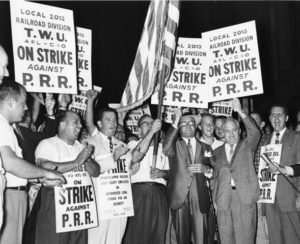Last week, the U.S. House of Representatives passed “labor groups’ top legislative priority, a bill aimed at strengthening workers’ rights to unionize,” setting the stage for a Senate battle over labor rights.
Labor unions arguably created America’s middle class by raising wages for huge swaths of the working class. In addition to wages that supported a middle-class lifestyle, unions also bargained for and won safer working conditions, shorter hours, retirement and health benefits, and restrictions on unfair and worker-debilitating employer practices like rotating and split shifts, forcing workers to be on call without pay, etc.
Much of this is gone now, and social observers write about America’s “hollowed out” middle class. For millions of families, a middle-class life can be maintained only by piling on debt. (See article here.)
That’s due in a large sense to the relentless decades-long conservative campaign to eviscerate and destroy unions. Their membership has dropped from 35% to 6% of the private-sector workforce. With much of American industry offshored, the great industrial unions barely exist anymore.
The biggest feature of the so-called “PRO Act” is that it bans misnomered “right-to-work” laws; 27 states have them. These laws allow workers to reap the benefits of collective bargaining without paying union fees. Current law in all states allows workers to refuse to join a union, but in non-“right-to-work” states, a union that incurs negotiating expenses to obtain employee benefits can collect “shop fees” to reimburse those expenses.
“Right-to-work” laws were authorized by the 1947 Taft-Hartley labor relations law, which is still on the books. In addition to repealing that authorization, the PRO Act also would ” repeal many [other] elements of Taft-Hartley by resetting labor relations to look more like they did during the New Deal Era, when unions grew and thrived, … create tough new civil penalties for firing workers who take part in union organizing drives,” and require mandatory arbitration in certain instances.
 The idea behind the bill, which has no chance of passing the Senate while the filibuster is in place, is to strengthen unions and address some of the employer abuses that have thrived since union membership, and the protections it affords workers, has crashed under the pressure of reactionary anti-union laws.
The idea behind the bill, which has no chance of passing the Senate while the filibuster is in place, is to strengthen unions and address some of the employer abuses that have thrived since union membership, and the protections it affords workers, has crashed under the pressure of reactionary anti-union laws.
Read more details here and here.
Photo: Railroad workers striking in 1960